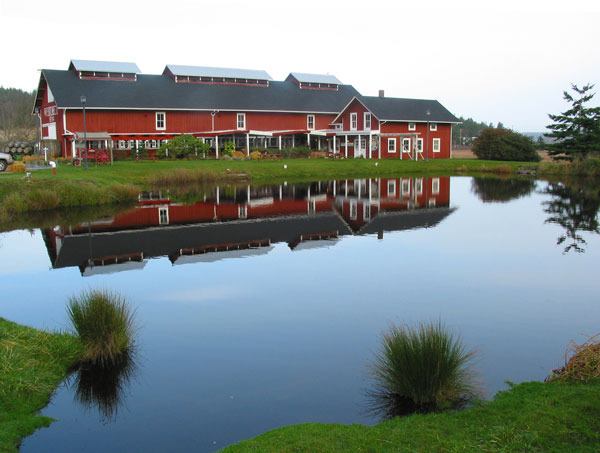Problems with Greenbank Farm’s septic system have prompted state involvement and could leave the Port of Coupeville with a pricey fix.
The state Department of Health recently attached a string of conditions to a permit for the farm’s large, onsite sewer system, and tasked the port commissioners with hiring an engineer to come up with modifications that will ensure the system is not a threat to public health or the environment.
The system was originally installed by the farm’s previous owner, Chateau Ste. Michelle, with the hopes of transforming the farm into a public event facility, said Port of Coupeville Executive Director Jim Patton.
The system was designed for a peak capacity of 5,000 gallons of waste per day.
Activities at the farm have changed over the years, however, and the system isn’t capable of handling the different kinds of waste, including oil and grease, that come from a restaurant and a pie-production facility, officials say.
“The system was not built to digest all of those things,” Patton said.
Staff over the past four years have been “band-aiding” the system while reporting the situation to the state Department of Health, Patton said..
Patton said grease traps were installed at the restaurant and kitchen, and staff faithfully cleaned those traps. Nonetheless, grease found its way into the septic system.
Patton reported the situation to state regulators and has worked to find a permanent fix.
The state health department has improved monitoring efforts of large, onsite sewer systems, or LOSS — Island County currently has 52, according to agency officials.
“The concern is they aren’t being properly maintained,” said Denise Lahmann, LOSS program manager for the state Health Department.
Until three years ago, the state agency didn’t have the staff to perform such work. After statutory changes were made in 2009 and rules written in 2011, staff were able to start looking for septic systems, Lahmann said.
Now staff are looking at permits in greater detail and are trying to keep tabs on about 600 such sewer systems across the state.
“We believe we need to hold system holders and operators accountable,” Lahmann said.
If problems arise with a system, she said, the Health Department will work with the owner to come up with logical, financially feasible solutions.
In the case of Greenbank Farm, she said the first thing is to learn more about its septic system. State health department officials have asked for water quality monitoring data from the Greenbank Farm.
There’s concern that the large amount of fats and oils will coat pipes and fill the pores that lead into the soil.
It’s likely additional treatment will be needed for the high-strength waste that is going on the farm’s sewer system, Lahmann said.
She added that she is pleased with the level of cooperation from port officials.
To meet conditions of the state permit, port staff must clean the pump, siphon chamber, drain and inspection ports. They must also develop a cleaning plan.
Documentation must also be submitted to the health department by the end of the year.
Finally, the port is being required to hire a licensed engineer by April 2014. That engineer will evaluate the system and design any modifications to ensure the farm’s system protects public health and the environment.
Approved modifications must be completed by April 2015 and installed within one year.
Patton said he is confident the port has enough money to hire the engineer and complete the design work.
But to change the septic system, said Patton, the port will need to seek grant funding.
The port is seeking $70,000 from the Rural County Economic Development Fund.
Money for that fund comes from a .09 percent sales tax rebate from the state.
Patton said application for the fund opens in April 2014.
“We will be working on a request,” Patton said.


